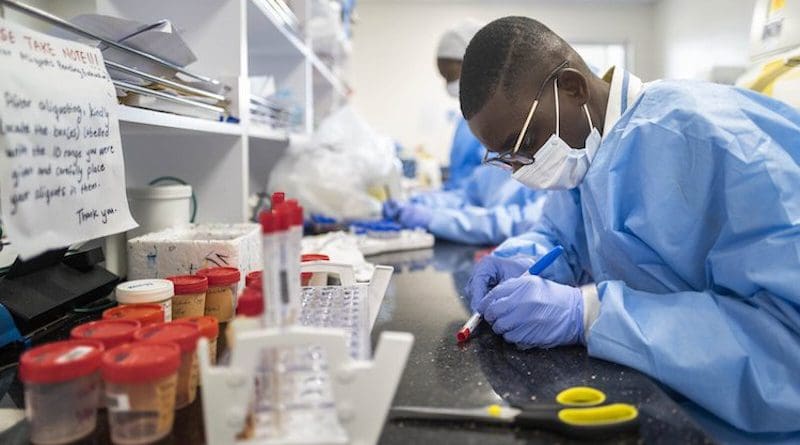Overcoming Vaccine Inequities And Enabling Small States’ Post-COVID-19 Recovery – OpEd
By IDN
By P. I. Gomes*
The “catastrophic moral failure” into which the world is seen as heading, according to the World Health Organization (WHO), Director-General, Dr. Tedros Ghebreyesus, can readily be understood as having its ideological basis in the callous principle of “profits before people for optimum shareholder-value”.
Our 21st century world of increasing gross inequality need not sound so “catastrophic”. Its origin lies in the historically dominant practice of large multinational pharmaceutical corporations delivering well-researched products, supposedly, to improve/save the plant, animal or human life.
That sharp condemnation by the WHO DG, addressing the Executive Board of the UN specialized agency, once again, illustrates the dismal spectacle of large scale and structured inequality in the distribution and administration of vaccines for immunization against the Covid-19 pandemic.
Illustrating the scale of the inequity, Euronews reported (January 18), on the remarks made by WHO DG Dr. Tedros, that whereas more than 39 million doses of vaccine have been administered in at least “49 higher income countries”, only 25 doses have been given in “one lowest income country”.
In admitting to such facts, one understands the DG’s blunt language that the “the world is on the brink of a catastrophic moral failure – and the price of this failure will be paid with lives and livelihoods in the world’s poorest countries.”
Recent history of the lamentable mistakes that were made in treatment of the HIV and H1N1 pandemics confirms how some countries and medicinal companies prioritized “bilateral deals” that made prices on needed drugs escalate beyond the reach of many poor countries.
Restricted access to vaccines by small and poor states is not merely another “moral failure” but tragic outcomes of a pattern of systemic injustice between rich and poor, underlying the unequal distribution of wealth, technology and the world’s global goods.
This need not surprise those who can recall the historical experiences of the 1970s and 1980s by the multinationals, known for super profits from pharmaceuticals and agro-chemicals with toxic side effects to farmers, farm workers and rural households in developing countries in Africa and Latin America.
Chemicals for weed control or the baby-food scandals of high infant mortality rates due to aggressive promotion of baby foods in circumstances without proper instructions for usage and the absence of adequate water and sanitation. Profits from sales of baby products matter more than public health education and food safety.
UN Secretary-General’s appeal & CARICOM’s Summit call
Today’s two million deaths from the Covid-19 pandemic was described by UN Secretary-General António Guterres as a “heart-wrenching milestone” and clearly demonstrates “the absence of global coordination”. The Secretary-General regards this “deficit” of coordination as in need of “far greater solidarity” at the global level.
Indeed, this is highly desirable and needs to be encouraged but it is far from coming to grips with the systemic inequality in the access to and distribution of what must be treated as a public good, to overcome the global crisis of 97 million infected persons and more than 2 million deaths.
Seen from a multilateral perspective, the Special Emergency Meeting of the Heads of Government of the Caribbean Community (CARICOM) on January 12, 2021 has proposed that a global summit be convened to address equitable access and distribution of the vaccines to combat the Covid-19 pandemic.
This is indeed a commendable initiative and would hopefully receive the necessary widespread support. For instance, the Commonwealth Heads of Government Meeting (CHOGM) on June 21, 2021 – which was postponed last year – because of Covid-19 – could well witness an agenda item on the Pandemic and birth a robust debate and resolute action to address vaccines’ inequity in a post-Covid Recovery strategy.
Similarly, one would expect the Group of 77 & China to see the merit of the CARICOM initiative and mobilise the support of its 134 developing countries. Such an event can usefully include an agenda for a deep interrogation of what is so conveniently captured under the concept of “global public goods”.
If ever that concept needed its concrete applicability to be demonstrated in practice, for the benefit of all humanity, it is now. In the face of the world confronting the devastating loss of life, irrespective of national borders, but with harshly discriminatory treatment against “those most in need” among the aged and from poor countries, while the predominant access to vaccines is enjoyed by the developed countries, who can afford to pay and guarantee doses for their populations.
To partially address an equitable distribution and enable universal access to the knowledge, production and distribution of WHO-regulated vaccines, the COVAX facility is supposed to provide a 20% guaranteed supply of doses to all countries. But this still leaves countries to be part of the competitive scramble to secure supplies from the multinationals or through bilateral governmental arrangements with producing countries, such as Russia or India.
It is evident that major policy and organizational issues need a serious multilateral discourse and the practice of “global solidarity”, about which Secretary-General Guterres spoke. Without that the systemic inequity that increasingly characterizes relations of government, business and society will persist. This will once again witness the predominance of “profits over people” and loss of lives will continue from Covid-19.
It’s good that hopefully several populations will be inoculated but one need to bear in mind that “none are safe, until all are safe”! [IDN-InDepthNews – 23 January 2021]
*The writer, Dr Patrick I Gomes, was Secretary-General of the African, Caribbean and Pacific (ACP) Group of States for five years until February 29, 2020. The 79-nation inter-regional body officially became the Organisation of African, Caribbean and Pacific States (OACPS) on April 5, 2020. Dr Gomes was previously Ambassador of the Republic of Guyana to the EU in Brussels.

